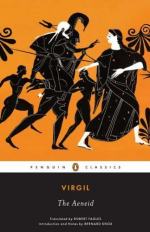|
This section contains 5,063 words (approx. 17 pages at 300 words per page) |

|
SOURCE: "The 'Old' and the 'New' in Vergil's Aeneid," in The Poetic Tradition: Essays on Greek, Latin and English Poetry, edited by Don Cameron Allen and Henry T. Rowell, The Johns Hopkins Press, 1968, pp. 63–80.
Duckworth was a classical scholar and educator. The following essay was originally delivered as a lecture at The Johns Hopkins University during the academic year 1965–66. Below, he analyzes the versification, structure, and themes of the Aeneid, especially as they are displayed in the "corresponding" Books II and VIII.
Vergil ranks with Homer, Dante, and Milton as one of the supreme epic poets of Western literature, and, just as Vergil was indebted to Homer, so the achievements of the two later poets would have been impossible without the influence of the Roman poet. Vergil's pre-eminence was realized almost as soon as he began work on the Aeneid; the poet Propertius wrote: "Something greater than the...
|
This section contains 5,063 words (approx. 17 pages at 300 words per page) |

|


